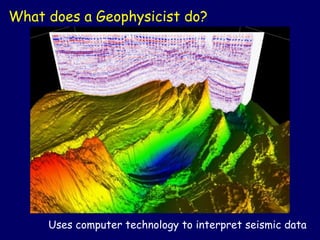All Categories
Featured
Table of Contents
Uses For Geophysical Data in Brookdale WA 2022
This work is progressively contracted out, so consultancies provide another source of employment. Consultancy companies differ in size, from extremely little companies to large multinationals. Some consultancies are rather specialised in utilizing particular geophysical methods or operating in particular locations, while others provide a more varied variety of services to their consumers.
The extraction of gas from land fill sites is another area of work and this might grow in the future. Expedition business may undertake work for building and construction firms, water business, mining companies and ecological companies, so geophysicists may be used in any of these settings. Other companies include: geological surveysgovernment bodies and agenciesuniversities and research study institutes.


Vacancies might be noted in the oil and gas sector press. Recruitment is impacted by oil cost changes and the level of competition for positions differs depending upon this. Careers Days, which cover the full variety of geoscience careers and are usually participated in by a number of key market companies, are run by The Geological Society.
Geophysical Surveys For Petroleum in Bickley WA 2020
Some of the large oil and gas business offer a full two-year structured training programme across the breadth of geophysics, consisting of the chance to experience operate in numerous groups prior to specialising in one area. Your training might consist of deal with: existing wellsmagnetic and gravitational prospective field information analysisresearchrock analysis. It's more typical for your preliminary training to be provided on the task.

There might be a probationary period throughout which you work together with a knowledgeable colleague. Competency-based appraisals occur frequently in many companies. In smaller sized companies, and for academic posts, there is not likely to be any official training - you'll be expected to start work straightaway and get abilities as you go along.
If you work for a smaller sized company, you might find that you need to take duty for organizing and funding your own advancement and training. If you have a geology degree, membership of The Geological Society can be useful for networking and for keeping up to date with the market.
Geophysical Surveys - Method Types And Work Tehniques I ... in Crawley WA 2023
You might also find it helpful to join the PESGB (The Petroleum Exploration Society of Great Britain, which has a geophysics unique interest group. After a probationary duration, and when you have actually gained some experience, you could advance to senior geophysicist, then team leader and after that into a senior role in management.
The ease of movement between functions depends on the business structure. Study at Masters or Ph, D level in a subject related to geophysics or geosciences might aid with your career advancement and progression. The employment market within the oil and gas industry is really depending on rate and this might affect your opportunities for profession progression.
Nevertheless, not all jobs are reliant on the oil and gas industries. For knowledgeable geophysicists, freelance consultancy provides an excellent route for career advancement. You can also specialise in a particular area of geophysics. As a geophysicist, you're most likely to have several jobs throughout your working life. Global mobility is vital for dealing with peaks and troughs in different countries at various times.
Geophysical Survey in Perth Australia 2022
From geophysics, it's possible to concentrate on seismology (finishing further training to become a seismic interpreter) or to move into associated locations such as engineering geology or hazard forecast.
Deciding what to study in college is a hard choice. Even if you understand that your field of interest lies in science, what program of study is best for you? If you make the choice to significant in physical and biological sciences and pursue a career as a geophysicist, you're preparing for an amazing and profitable profession.
The very first action to achieving your objective of ending up being a geophysicist is making a degree. Even for entry-level positions in the field of geoscience, you'll require a bachelor's degree (a geophysicist college degree) from an accredited college or university. Some research positions require candidates to hold master's degrees or perhaps Ph.
What Does A Geophysicist Do: Duties And Responsibilities in Beeliar Aus 2020
Doctoral degrees are particularly crucial if you plan to teach at a four-year institution. Geophysicists apply physics principles and strategies to study the gravitational, magnetic, and electric fields of the earth. This enhances scientists' knowledge of both the world's interior core and its surface. Geophysicists must be able to: evaluate rocks, photos, and other pieces of data conduct research both in the field and in labs develop maps and charts of their findings compose reports To achieve all this, students need a specialized education for geophysicist careers.
As stated above, you'll require a bachelor's degree in geoscience or a related discipline, such as a physical science or a natural science, to land an entry-level job. Students can also prepare by majoring in topics like: Biology Chemistry Computer system science Engineering Mathematics Physics The above geophysicist majors offer a more generalized approach to a single clinical discipline, however the majority of programs need trainees to take one or more geology course.
Table of Contents
Latest Posts
How To Become A Geophysicist in Mount Claremont Oz 2023
Geophysical Survey Next Step In Carbon Storage Study in Brookdale Western Australia 2023
Geophysical Investigations in Calista Western Australia 2022
More
Latest Posts
How To Become A Geophysicist in Mount Claremont Oz 2023
Geophysical Survey Next Step In Carbon Storage Study in Brookdale Western Australia 2023
Geophysical Investigations in Calista Western Australia 2022